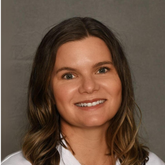From RN to MD: Reflections on Interprofessional Communication from a Palliative Care Physician

Before attending medical school to become a palliative care physician, I spent four years working as a nurse in a medical intensive care unit.
The ICU was a challenging and fast-paced place, caring for the sickest patients in the hospital. I found my conversations with patients and family members just as rewarding as learning how to manage a patient in septic shock. I listened to stories about grandchildren or first dates—and how family members were worried about their loved ones. They would ask me about lab values or chest X-rays, trying to make sense of what the doctor had just gone over.
Overwhelmed by having a loved one with serious illness in the hospital, families didn’t always understand what was happening. The doctor’s message about the patient worsening was often lost in medical jargon; families sometimes walked away from a conversation even more confused and frustrated, looking to me for explanations, comfort, and help with decisions. I wasn’t prepared to walk with them on this journey.
I didn’t realize I could have spoken up and collaborated with the doctor, helping them realize what the family didn’t understand. I also didn’t know that I could have asked the doctor whether the palliative care team could be helpful for the family in navigating decision-making. Too many communication gaps existed in the system, and I didn’t know how to circumvent them.
"Too many communication gaps existed in the system, and I didn’t know how to circumvent them."
We can do better, I thought to myself. I knew I needed to be part of the solution. While my primary goal of becoming a palliative care physician was to help teach advanced communication skills, I’ve resolved to address communication gaps that exist between physicians and nurses. I always look for ways to develop rapport with nurses and encourage open lines of communication.
The value of empowering nurses to speak up
I was recently called to consult on symptom management for a young woman with metastatic ovarian cancer who was experiencing excruciating pain and episodes of delirium. During the consult, I encountered several nurses who regularly cared for her and developed a relationship throughout her several-week stay. They were distressed watching her struggle and become so desperately ill.
I realized that I could empathize and address this head-on. When I checked in with the nurses about medication adjustments, I said things like, “It can be really hard to watch somebody go through this,” and gave them space. This let them know that I wanted to hear from them and their feelings and experiences mattered to me. It offered an opportunity to tell me how they were feeling—and to share information that might also help me take better care of our patient.
"Actions like these empower nurses to speak up about their concerns. It helps them feel heard and helps physicians to glean important information about their patients."
Actions like these empower nurses to speak up about their concerns. It helps them feel heard and helps physicians to glean important information about their patients. It can also address some of the moral distress that nurses may develop when they feel like the situation is out of their hands or that they are contributing to suffering (through dressing changes, etc.), which I remember feeling as a nurse. Ultimately, it also benefits the patients and their families.
Since not every patient with serious illness receives palliative care, I encourage nurses to feel empowered to suggest when a patient may benefit from a consultation with the palliative care team—and to know how valuable it can be to have their perspective in a family meeting. You can ask to be included.
Sometimes the medical team knows the outlook doesn’t look positive for a patient. They may even talk about it together in the team room or before entering a room on rounds. Instead, they may focus on small daily updates with the patient or family rather than pausing to discuss concerns about the big picture. This may turn into an instance where consulting palliative care for support would be helpful. However, it may also be helpful to brush up on your communication skills so you’ll feel better prepared to have difficult conversations with patients and families.
Making time to check in with nurses
My health system includes nurses in multidisciplinary rounds in the intensive care unit, which is a step in the right direction when incorporating the nurse’s perspective. Research shows that multidisciplinary rounds improve communication and enhance teamwork, which not only improves patient care but can also improve patient and caregiver perceptions of that care. The reality of having multidisciplinary rounds is more difficult outside of the intensive care unit. It varies widely in different hospitals, so I also use other strategies to get feedback from nurses about seriously ill patients.
As a physician, I may only get 15 minutes per day directly interacting with each patient. Nurses, however, spend more time with them and thus can pick up on information and details that no one else can. For instance, I may not see how much a patient struggles to get to the bedside commode without help, or how anxious the patient is throughout the day. So, I regularly check in with nurses who share their perspectives and then ask the nurses to be on the lookout for certain things, such as how much they eat throughout the day.
I ask nurses to describe what’s happening with the patient. Have they noticed any changes? How does the family seem to be coping? I’ve built these check-ins into my workflow, but if it’s a busy morning or the nurse is with another patient, I always ask a nurse for their phone number and call later for more details. As part of my check-in process, I also ask about a nurse’s experience, as this may color their responses. For instance, a nurse fresh out of school may have encountered a particular situation for the first time, while a nurse with a decade of experience may have a different perspective.
Filling in the gaps together
Together, nurses and physicians can provide better care for patients with serious illness, and their families, by committing to better communication and understanding the valuable perspective of each team member. A nurse should be empowered to say to a physician, “Hey, I’ve noticed something and wanted to discuss it with you.” And a physician should be willing to ask the nurse to weigh in, “Do you think this patient is improving? What are you seeing?”
"Together, nurses and physicians can provide better care for patients with serious illness by committing to better communication."
These simple questions will draw bridges in conversations and fill gaps in communication. My biggest lesson on this journey so far is that we should all learn to be better communicators, not just with our patients and their family members but also with each other. It can help us see a fuller, richer picture of our patients together, which means we are better equipped to have serious conversations about the direction of their care.

Be the first to read articles from the field (and beyond), access new resources, and register for upcoming events.
SubscribeEdited by Melissa Baron. Clinical review by Andrew Esch, MD, MBA.
